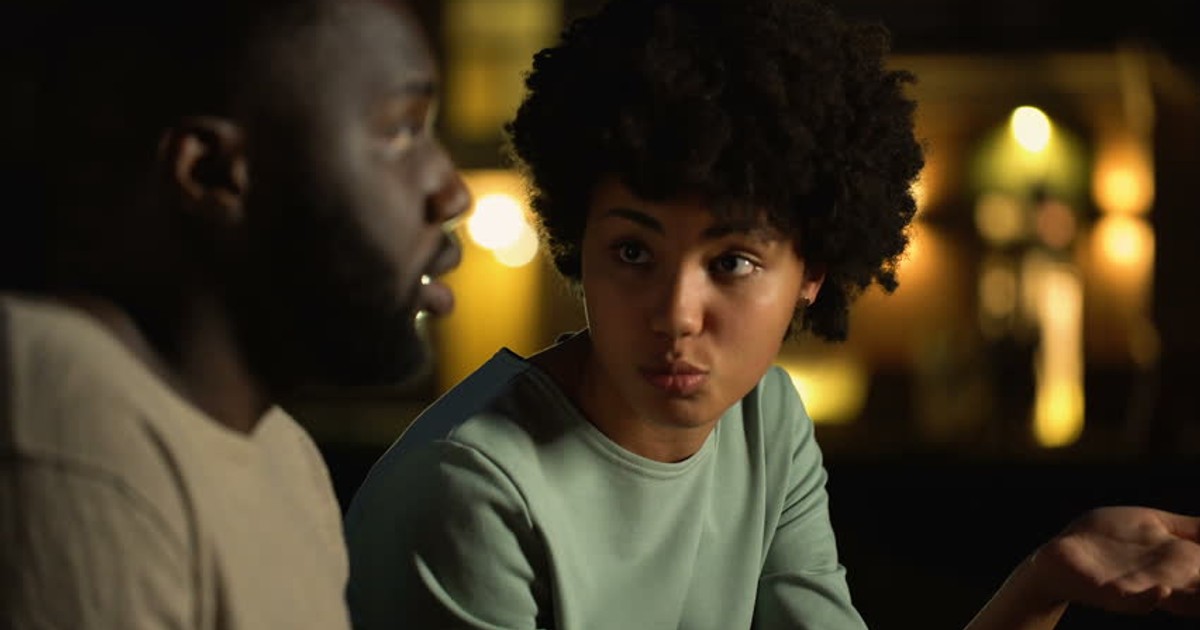OPINION
Stanley Nwabali: Has Super Eagles Finally Found Vincent Enyeama’s Replacement?
Published
10 months agoon

Nigerian fans are cheering on their new hero in goalkeeping, Stanley Nwabali. This 27-year-old shot-stopper has pulled off amazing saves in recent matches, earning widespread praise and solving a previous concern about Nigeria’s goalkeeping position. His impressive performance against South Africa adds to his earlier heroics that helped Nigeria advance to the AFCON semi-finals, leaving fans confident and excited for their team’s future.
Stanley Nwabali against South Africa
The Super Eagles soared to the AFCON finals on the wings of their heroic goalkeeper, Stanley Nwabali. After a tense match against South Africa ended 1-1, the fate of the game hung in the balance during penalty kicks.
While everyone expected South Africa’s goalie to shine based on his previous performance, it was Nwabali who stole the show. This 27-year-old star, playing for Chippa United, rose to the occasion, blocking two crucial penalties and securing Nigeria’s victory.
Now, the Super Eagles’ dream of lifting their fourth AFCON trophy is alive and well! They’ll face Ivory Coast in the finals, fueled by Nwabali’s heroics and their own fighting spirit. Buckle up; it’s going to be an exciting match.
Nwabali saves Nigeria against Angola
Nwabali’s quick reflexes saved Nigeria early on. Just when it seemed Angola might score, the sharp goalkeeper, Nwabali, made a fantastic save at the near post, denying Mabululu and keeping the game scoreless.
This wasn’t a fluke either, as Nwabali has been impressive since joining Chippa United last year. In just 15 appearances, he’s collected seven clean sheets, solidifying his position as their starting goalkeeper.
Nwabali impresses after returning from injury
Pre-match jitters rippled through Nigerian fans as news of Nwabali’s knock against Cameroon surfaced. Could he recover in time for the Angola clash? Thankfully, doubts were dispelled as the shot-stopper, once known for his exploits at Katsina United, not only returned but shone brightly against the Palancas Negras. His commanding presence in goal gave confidence to the well-organized Super Eagles’ backline, anchored by the ever-reliable Troost-Ekong.

Nwabali’s composure and agility have been hallmarks of his AFCON performance. Throughout the tournament, he’s stood firm, his gloves a formidable barrier against opposing attacks. Only once has he been breached—in the opening game against Equatorial Guinea, where a lapse in the Nigerian defence allowed Salvador to find the net.
Get the latest and greatest updates right away! Join our exclusive WhatsApp channel and never miss out on exciting news again.
His assured performance against Angola is just another feather in his cap. More importantly, it speaks volumes about his resilience and ability to bounce back from setbacks. From facing fitness concerns to being a guardian of the goal, Nwabali’s AFCON journey has been a captivating narrative of determination and talent.
Like Vincent Enyeama Stanley Nwabali
Nigerian football fans have found a new hero in goalkeeper Stanley Nwabali. Following in the footsteps of legendary goalie Vincent Enyeama, Nwabali’s journey mirrors some exciting parallels.
Enyeama burst onto the scene in 2002, making a spectacular save against England’s Paul Scholes at the World Cup. His career soared thereafter, earning him accolades and clean sheets for both club and country.
Similarly, Nwabali’s debut for Nigeria this year against Equatorial Guinea showcased his potential. His impressive performances, especially the penalty saves against South Africa, have drawn comparisons to Enyeama’s heroic four-penalty save against Tunisia in 2004.
Nwabali’s rise addresses a recent goalkeeping crisis for Nigeria, stepping in where others faltered. His consistent brilliance has caught the attention of European clubs, with teams like Union-Saint-Gilloise already expressing interest.
If Nwabali maintains this momentum, he might just replicate Enyeama’s legendary career, becoming a cornerstone for Nigeria and etching his name in football history.
Football fans everywhere are keeping their eyes glued to Nwabali, hoping he’ll continue to shine and bring glory to the Super Eagles.
Check out more updates here.
You may like
-


Benin & Sudan Qualify For AFCON As Ghana, Nigeria & Tunisia Exit
-


AFCON 2025: What Rwanda, Benin & Libya Have To Do To Qualify Like Nigeria
-


Nigeria Seal Qualification For 2025 AFCON As Osimhen Equals Odegbami’s Goal Tally
-


2025 AFCON: Ademola Lookman And Alex Iwobi Headline Nigeria Squad For Rwanda And Benin
-


Arsenal Star Martin Odegaard Back In Training Ahead Of Champions League
-


Vinicius Junior Believes Fighting Racism Led To Ballon d’Or Defeat

Arguments in relationships test every couple’s communication skills. They reveal deeper emotional dynamics. Healthy partnerships transform conflicts into opportunities for understanding.
Navigate arguments in relationships with strategic approaches. Stop escalation before it destroys the connection. Recognize that disagreements happen naturally. Your response determines relationship quality.
These relationship arguments require emotional intelligence. Listen actively. Control reactive responses. Use compassionate language. Avoid accusatory statements. Show genuine respect.
Understand that arguments in relationships aren’t battles to win. They’re conversations to understand. Each disagreement offers a chance to strengthen bonds. Develop mutual empathy.
The final key to managing arguments in relationships involves staying calm. Take deep breaths. Pause when emotions run high. Focus on solutions, not problems.
Successful couples treat arguments as growth opportunities. They communicate openly and respect each other’s perspectives. They commit to mutual understanding.
Choose connection over being right. Transform conflicts into moments of intimacy and trust.
Below are 6 tips you can use to de-escalate arguments in relationships:
1. Take a Break
Arguments in relationships can quickly spiral out of control. When conversations become heated, take a strategic timeout. Step away from the intense moment.
Give yourself space to reset emotionally. Take a walk to clear your mind. Listen to calming music. Practice meditation techniques. Breathe deeply and center yourself.
The goal of taking a break during arguments in relationships is emotional regulation. Return to the conversation when both partners feel calm and rational. This approach prevents saying hurtful things in the heat of the moment.
2. Active Listening
Mastering active listening transforms arguments in relationships. When your partner speaks, give full attention. Silence your inner defensive voice. Avoid interrupting or preparing counterarguments. Focus entirely on understanding their perspective.
Ask clarifying questions. Repeat what you’ve heard to ensure comprehension. Show genuine interest in your partner’s feelings. Demonstrate that you value their emotional experience.
3. Use “I” Statements
Language matters in arguments in relationships. Replace blame with personal vulnerability. Instead of accusatory statements like “You always ignore me,” express your feelings directly. Say, “I feel lonely and disconnected when we don’t communicate.”
“I” statements reduce defensiveness. They invite empathy and understanding. They transform potential conflicts into opportunities for a deeper connection.
4. Avoid Personal Attacks
Arguments in relationships should never become character assassinations. Stick strictly to the current issue. Avoid bringing up past mistakes or criticizing your partner’s personality. Focus on resolving the specific problem at hand.
Maintain respect. Treat your partner with kindness, even during disagreements. Your goal is collaborative problem-solving, not winning a battle.
5. Find Common Ground
Every argument contains potential for understanding. Look for areas of agreement, no matter how small. Acknowledge shared feelings or goals. Build a bridge of mutual understanding.
Collaborative approaches transform arguments in relationships from confrontations to conversations. Work together as a team. Seek solutions that satisfy both partners.
6. Seek Professional Help
Persistent communication challenges require professional intervention. A qualified therapist can provide:
- Objective communication strategies
- Tools for emotional regulation
- Insights into underlying relationship dynamics
- Personalized conflict resolution techniques
Professional guidance helps couples break destructive communication patterns. It provides skills for healthier, more understanding relationships.
Transforming Conflicts
Arguments in relationships are growth opportunities. They test and strengthen emotional bonds. By approaching conflicts with empathy, respect, and strategic communication, couples can turn challenges into moments of deeper connection.
Disagreements are normal. Respect is essential. Love is a continuous journey of understanding.
Click here to read more articles on relationships.

Support your partner intentionally through daily actions and authentic expressions of care. Learning how to be a supportive partner demands dedication and regular practice to strengthen your relationship bonds.
In your journey to discover how to be a supportive partner, focus on developing habits that nurture emotional connections and foster mutual understanding.
Your presence, active participation, and genuine interest in your partner’s well-being create foundations for lasting happiness. Commit to showing up consistently, whether during challenging times or moments of celebration.
Understanding how to be a supportive partner involves recognizing and responding to both spoken and unspoken needs with empathy and patience.
As you explore how to be a supportive partner, remember that small, thoughtful gestures often carry more weight than grand displays.
Build trust through reliability, demonstrate respect through active listening, and maintain emotional availability even during busy periods.
Transform your relationship by implementing positive changes that reflect your commitment to growth and mutual support. Take a look at five of them below.
1. Master Active Listening
Put down your phone when your partner speaks. Turn your body toward them and maintain comfortable eye contact. Notice their body language and tone of voice.
Practice reflective listening by repeating key points in your own words. Say things like, “What I’m hearing is…” or “It sounds like you felt…” This shows you’re truly processing their words.
Ask clarifying questions instead of making assumptions. Avoid planning your response while they’re still speaking. Focus completely on understanding their perspective before forming your reply.
Don’t rush to offer solutions unless they specifically ask for advice. Sometimes people just need someone to hear them out. Create a safe space where your partner feels comfortable sharing their thoughts and feelings.
2. Show Up Consistently
Support extends beyond major life events. Remember small details about their day-to-day life. Ask about that work presentation they mentioned or their friend’s health situation.
Mark important dates in your calendar. Remember deadlines, appointments, and events that matter to them. Send encouraging messages before big moments.
Share the mental load of running your household. Take initiative with chores and responsibilities. Don’t wait to be asked for help.
Be reliable with your commitments. If you say you’ll do something, follow through. Your consistency builds trust and security in the relationship.
3. Validate Their Feelings
Accept your partner’s emotions without judgment. Avoid dismissive phrases like “You’re overreacting” or “It’s not that bad.” Their feelings are valid, even if you don’t fully understand them.
Use validating statements such as “That must be really difficult” or “I can see why you’d feel that way.” Show empathy even when you disagree with their perspective.
Create space for all emotions – positive and negative. Don’t try to force cheerfulness when they’re down. Let them process feelings at their own pace.
Share in their joy and excitement too. Celebrate their wins, no matter how small. Your genuine enthusiasm strengthens your bond.
4. Support Their Growth
Encourage your partner’s goals and dreams. Ask about their aspirations and help brainstorm steps to achieve them. Offer practical support where possible.
Give them space to explore new interests. Don’t make them feel guilty about time spent on personal development. Their growth benefits your relationship too.
Challenge them gently when needed. A supportive partner balances acceptance with encouragement to overcome limiting beliefs.
Stand behind their decisions, even if they differ from your preferences. Trust their judgment and ability to make choices for themselves.
5. Take Care of Yourself
Maintain your own emotional health. You can’t pour from an empty cup. Regular self-care helps you show up better for your partner.
Set healthy boundaries. Being supportive doesn’t mean sacrificing your own needs. Communicate your limits clearly and respectfully.
Develop your own interests and friendships. A well-rounded life makes you a better partner. Don’t rely solely on your relationship for fulfilment.
Seek help when needed. Consider couples therapy or personal counselling to work through challenges. There’s strength in knowing when to ask for support.
Practical Tips for Daily Support
Create daily connection rituals. Set aside time each day to check in with each other without distractions. Even 15 minutes of focused attention makes a difference.
Use positive touch when appropriate. Hold hands, offer hugs, or give a gentle pat on the back. Physical affection can communicate support without words.
Express gratitude regularly. Thank them for specific things they do. Appreciation helps partners feel valued and motivated to continue supporting each other.
Step up during stress. Notice when your partner feels overwhelmed. Take extra responsibilities off their plate without being asked.
Common Pitfalls to Avoid
Don’t keep score. Support shouldn’t be transactional. Focus on giving without expecting immediate returns.
Avoid comparative suffering. Never minimize their struggles by pointing out how others have it worse. Pain is relative and personal.
Don’t make assumptions about what they need. Ask directly how you can help. Different situations might require different types of support.
Resist the urge to fix everything. Sometimes being present and listening is more valuable than finding solutions.
The Long-Term Impact
Consistent support builds relationship security. Partners who feel supported are more likely to take positive risks and pursue personal growth.
Mutual support creates a stronger bond. When both partners commit to supporting each other, the relationship becomes more resilient to challenges.
Supportive relationships contribute to better mental and physical health. Partners in nurturing relationships often report higher life satisfaction.
Remember that becoming a supportive partner is an ongoing journey. Practice these steps daily, learn from mistakes, and keep growing together. Small, consistent actions build the foundation for a strong, lasting relationship.
Visit here to read more on love and relationships.
OPINION
Should You Tell Your Partner Everything About Your Past or Not?
Published
2 weeks agoon
November 10, 2024
Should You Tell Your Partner Everything? Ask anyone, and they’ll likely say honesty is the cornerstone of a strong relationship. No doubt, being open about who you are and what you like or dislike is essential for a healthy bond.
But how honest should you actually be? Should you reveal every detail about your past? Is it healthy to talk about former relationships, or is it okay to keep some things private?
Your experiences, good or bad, shape who you are today, making it hard to leave them behind entirely. Naturally, past topics might arise at any stage in your relationship.
How you handle these discussions can make or break your connection. Don’t worry, though; in this article, we’ll explore how to approach these questions and discuss your past in ways that protect and strengthen your relationship.
Should Couples Talk About Past Relationships?
Not everyone likes to share every detail of their past. Some people prefer to take certain experiences to the grave, while others feel comfortable being completely transparent. Every relationship is unique, and so are the boundaries around sharing.
Full disclosure is crucial for some, while others are satisfied with a basic outline. However, some events from your past shaped who you are, and sharing them can help build a deeper connection.
If you’ve had a toxic relationship, you might not see the relevance in discussing it with your new partner, yet sharing can help them understand who you are, what was missing, and what you’re carrying forward.
On the other hand, disclosing too much might overwhelm a partner who struggles with “retroactive jealousy”—a common issue where someone becomes preoccupied with their partner’s past relationships.
This can create intense emotional reactions, so consider the balance carefully.
If you’re wondering, “Should couples talk about past relationships at all?” Remember, the choice is yours, but the approach matters.
Is It Important to Tell Your Partner Everything About Your Past?
In short, yes—some past information is essential to share. But this doesn’t mean sharing every minor detail. Some things hold no relevance to your current relationship and are better kept private.
Reflect on questions like, *“Does the past matter in a relationship?”* and *“What should I say when my past comes up?”* Know that your past does matter. It can reveal insights into who you are and the patterns you bring into a relationship.
For instance, how your partner describes their exes can reveal a lot about their growth or challenges in relationships. If they blame all breakups on others, it could signal difficulty in taking responsibility.
Similarly, withholding something important might backfire if they discover it from someone else. This can shake their trust and impact your relationship’s foundation.

How Much Should You Tell Your Partner About Your Past?
Finding balance is key. How do you decide what to share and what to keep private? Here are five important things from your past that your partner should know.
5 Things from the Past You Should Tell Your Partner
1. Medical History Impacting Fertility or Sex Life
Disclosing medical procedures that may affect intimacy or fertility early on prevents surprises and possible feelings of betrayal.
2. Sexual Health
While there’s no need to detail your entire sexual history, it’s wise to mention any STDs, recent tests, or other health-related issues.
3. Previous Serious Relationships
Your partner should know if you’ve been married, engaged, or have children with an ex. This can impact the dynamics of your relationship moving forward.
4. Reasons for Past Breakups
Explain any significant reasons for your past relationship’s end, like infidelity or abuse, as this can give insight into your current boundaries and needs.
5. Trauma or Triggers
Sharing past traumas that might affect your emotional response today allows your partner to support you better and avoid unintentionally triggering you.
5 Things from the Past You Shouldn’t Tell Your Partner
Not everything from your past needs to be shared, especially if it is not significant to your future together.
1. Every Detail of Past Relationship Issues
While it’s good to learn from past mistakes, avoid diving into exhaustive details. Focus instead on lessons learned.
2. Exact Number of Past Sexual Partners
This doesn’t define you, and if asked, offering a general idea without precise numbers can satisfy curiosity without causing unnecessary tension.
3. Nostalgia for Your Ex
Even if you miss certain qualities from past relationships, avoid voicing this. Simply suggest what you enjoy without comparing it to an ex.
4. Past Infidelity
If you’ve cheated in the past but committed to personal growth, sharing this might be too much for your partner. Only mention if relevant to your current relationship’s integrity.
5. Intimate Details of Past Encounters
Describing intimate moments with past partners can lead to insecurity in your current relationship. Leave these details behind to foster emotional safety.

Is It Okay Not to Tell Your Partner Everything?
While honesty and openness are essential for a healthy relationship, you don’t have to share every detail. It’s actually beneficial to maintain some privacy, especially for deeply personal or irrelevant matters.
Leaving out intimate details prevents misunderstandings and insecurity. Instead, share just enough to give your partner insight into who you are without feeling like they’re filling an ex’s shoes.
5 Tips on How to and How Much to Talk About Your Past with Your Partner
When bringing up the past, here are five tips to guide you:
1. Timing Matters
Share past relationship details gradually as trust develops. Avoid sharing too much too soon, especially in the early stages.
2. Avoid Oversharing
Stay mindful of what’s helpful to disclose. Avoid intimate details that add no benefit to your current relationship.
3. Minimize Focus on Your Ex
Avoid criticizing or idealizing your ex. Staying neutral and factual when discussing past relationships prevents misunderstanding.
4. Keep Expectations Realistic
Understand that your partner may respond differently than expected. Assess their emotional readiness before revealing sensitive details.
5. Set Boundaries
If certain aspects of your past are off-limits, set clear boundaries with your partner. Politely ask them to respect your privacy on topics unrelated to your relationship.
Factors to Consider When Deciding What to Share
Several factors can guide your decision about sharing your past:
- The Nature of Past Experiences: Reflect on what’s relevant and how open you feel about sharing.
- Potential Impact on Current Relationship: Be mindful of issues that could affect trust, communication, or shared goals.
- Your Partner’s Emotional Maturity: Gauge their readiness to handle sensitive information.
- The Depth of Your Relationship: Open up gradually as trust deepens.
- Your Comfort Level: Share only when you feel safe, ensuring mutual respect and boundaries.
To Share or Not to Share
Ultimately, the decision to reveal your past is yours. Knowing when and how much to share helps you navigate this sensitive territory.
Show vulnerability and honesty to build trust, but also consider your partner’s emotional readiness and the strength of your relationship. Take the time you need to figure out what works best for you both.
For helpful tips to navigate relationships, check here.
Latest


5 Fashion Mistakes Men Make That Women Find Unattractive
Fashion mistakes guys make can be a common pitfall for many of them. One of the biggest mistakes is wearing...


5 Things You Must Do To Make Sex Easy In Your Relationship
Sex in relationships demands intentional effort. Physical intimacy is complex and intertwined with emotional connections. Effective communication fuels sexual satisfaction....


How To De-Escalate Arguments In Relationships
Arguments in relationships test every couple’s communication skills. They reveal deeper emotional dynamics. Healthy partnerships transform conflicts into opportunities for...


Here’s The Best Recipe For Making Rice Fritters
What Are Rice Fritters? Rice fritters recipe is a way of turning leftover rice into crispy, irresistible snacks that tantalize...


You Can Make Your Kunu Drink With This Simple Recipe
Ever wondered how to make the kunu drink you love to consume? Kunu drink, a cherished Nigerian beverage, delights with...


How To Stop Snoring When Sleeping
Snoring disrupts sleep for both the person snoring and their partner, lowering overall sleep quality. It’s more than a nighttime...


5 Awesome Ancient African Beauty Practices
Ancient African beauty practices were rooted in nature and culture, blending self-care with physical well-being. These timeless rituals passed through...


5 Cheapest States To Live In Nigeria
Nigeria spreads its economic opportunities across 36 dynamic states. As living costs continue to rise in major cities in Nigeria,...


Here Are The 5 Oldest Tribes In Nigeria
Over 250 ethnic groups thrive within Nigeria, making it one of Africa’s most ethnically diverse countries. Among these ethnic groups,...


Nicki Minaj Features Davido On “The Pink Print” 10th Anniversary Edition
Nigerian superstar Davido has joined forces with Nicki Minaj for an exciting new track. The collaboration appears on the 10th-anniversary...
-Ad-




12 Daily Habits That Cause Mouth Odour Even After Brushing

Learn How To Cook Efo Riro Soup With This Easy Recipe

Do Bras Really Keep Breasts From Sagging? Check This Out!

See Cute Saint’s Collection At Lagos Fashion Week 2024

Meet Efunroye Tinubu, The Influential Slave Trader Who Controlled Lagos

3 Eggless Cake Recipes To Try At Home

5 Most Affordable Places To Eat Pasta In Lagos

5 Reasons Some Women Experience Stomach Pain After Sex

Here’s How You Can Brew Kombucha Tea In Nigeria

With This Simple Recipe You Can Make Nigerian Oha Soup!
Trending
-

 BUSINESS7 days ago
BUSINESS7 days ago6 Things To Consider Before Starting A Business In Nigeria
-

 MOVIES5 days ago
MOVIES5 days ago“The Interrogation Of Lotanna” Bags 6 Nominations At The FilmJoint Awards 2025
-

 INTERNATIONAL4 days ago
INTERNATIONAL4 days ago“Gladiator II” Records ₦99.1 Million In Its Opening Weekend At The Nigerian Box Office
-

 MOVIES6 days ago
MOVIES6 days agoCheck Out The Trailer For Femi Adebayo’s Directorial Debut, “Seven Doors”
-

 MUSIC6 days ago
MUSIC6 days agoSocial Media Reacts As Wizkid’s “Dance” Disappears From Apple Music Top 100
-

 ENTERTAINMENT6 days ago
ENTERTAINMENT6 days agoOur Parent’s Generation Didn’t Support Their Children’s Talents – Phyno
-

 FASHION4 days ago
FASHION4 days agoSkepta Graced Africa International Film Festival (AFRIFF) In Elegant Trad
-

 ENTERTAINMENT7 days ago
ENTERTAINMENT7 days agoSee Complete List Of Nominees At The FilmJoint Awards 2025

